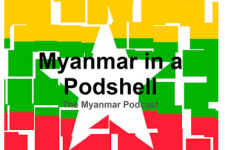The Good, the Right, the Just

In this episode of ‘Myanmar in a Podshell’ DIIS senior researcher Helene Maria Kyed and Nyan speak about the situation in Myanmar after the military coup with a focus on law and justice. They draw on the EverJust project’s research from 2015-2020 to reflect on how people’s access to justice in the formal state system has further deteriorated after the 1 February military coup. While the formal judiciary was mistrusted prior to the coup, it is now completely controlled and instrumentalized by the military junta to punish and oppress civilians and anyone opposed to military rule. There is no due process and rule of law. Although the military junta frequently try to justify their actions with reference to ‘the law’, as in the case of the recent executions of four political activists, the reality is that they do not follow legal procedures. Legal terms are merely used rhetorically, while justice is denied.
The political instrumentalization of law has a long history in Myanmar dating back to colonial rule, which inserted a highly punitive system centered on punishment and population control. The formal judiciary and the law were rarely associated with justice. Prior to the coup most people would resort to local customary systems and village or ward leaders, rather than report to the state system. There was a preference for informal resolutions and social harmony rather than formal procedures and punitive justice. In ethnic border regions parallel justice systems developed over the decades of struggles for self-determination and conflict with the central military state, and these continued to be used also after the 2015 elections, although there were efforts to reform the state justice sector.
After the military coup many village and ward leaders have been replaced by the military junta and many areas are affected by conflict, making it hard for these prior justice actors to resolve everyday disputes and crimes. Many feels there is nowhere to report and nowhere to seek justice. In some areas where the pro-democracy resistance is growing stronger and gaining territorial control, there are now new experiments with building alternative administrative and justice systems to rectify the complete absence of state provided justice. Yet there are many challenges as these new initiatives are unfolding in a highly volatile and conflict-affected context.
In this Podcast Helene Maria Kyed and Nyan also discuss what a future justice system may look like past military rule and in the event of the development of federal democracy. They argue that this should be based on equality and justice for all people residing in Myanmar and that developing new laws and judicial systems should be based on participatory dialogues and recognition of the customary and ethnic systems that already exist. It should not be a repeat of a centrally defined and controlled judicial system that has at the same time been highly militarized.
DIIS Experts


